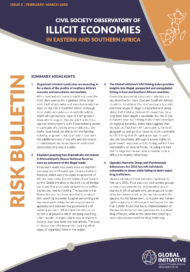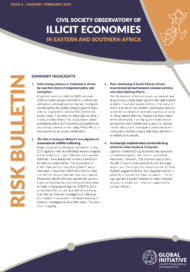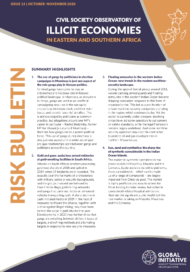Posted on 10 Mar 2020
PRESS RELEASE
The Global Initiative Against Transnational Organized Crime appoints Vusumzi (Vusi) Pikoli, former director of South Africa’s National Prosecuting Authority, to the Board of its Southern and East African regional office in Cape Town, South Africa, and as senior advisor for its global operations.
CAPE TOWN, 18 February 2020 – The Global Initiative Against Transnational Organized Crime (GI-TOC), an international civil society and independent policy
research organization specializing in organized crime, has appointed Advocate
Vusi Pikoli to the board of its Cape Town-based organization, from where its work in Southern and East Africa is undertaken. Pikoli has also been appointed as a senior advisor, part of a broader group of experienced practitioners who guide the overall work of the GI-TOC.
Mr Pikoli is renowned as a fiercely independent civil servant, acting impartially
without fear, favour or prejudice, despite sometimes working under intense
political pressure. He confers a wealth of experience in the law-enforcement, criminal-justice, anti-corruption governance and human-rights spheres to the Board of the GI-TOC.
As the National Director of Public Prosecutions and Head of South Africa’s
National Prosecuting Authority, Pikoli oversaw a number of high-profile
prosecutions, including charges of corruption against the then Deputy State
President Jacob Zuma and against former South African National Police
Commissioner and former president of INTERPOL, Jackie Selebi, who was convicted of corruption.
In December 2008, Pikoli was ‘relieved of his responsibilities’ by President
Kgalema Motlanthe in contested circumstances – even though his professional
competence has never been questioned.
In 1999, he was appointed as Director-General of the Department of Justice and Constitutional Development, a position he held until 2005. In this position, he and his department guided the South African delegation at the Vienna
negotiations for the UN Convention against Transnational Organized Crime
throughout the two-year negotiating period in 1999 and 2000.
After returning to South Africa in 1990 from exile in Zambia, where he had worked in the ANC’s Legal and Constitutional Affairs Department, Pikoli was appointed in 1994 as Special Advisor to the first Minister of Justice in post-apartheid South Africa, Advocate Dullah Omar.
He has worked in other roles since then, including legal-forensic investigations,
as a commissioner in the Khayelitsha Commission of Enquiry and as the first Provincial Police Ombudsman in the Western Cape. He is currently the Chief Risk and Compliance Officer of South African Airways. He is an adjunct professor at the Nelson Mandela School of Public Governance, University of Cape Town. Pikoli studied at Fort Hare University, South Africa, obtained two law degrees at the National University of Lesotho, and an LLM at the University of Zimbabwe.
Pikoli brings values of integrity and governance experience to the Africa Board of the GI-TOC. Peter Gastrow, the chairperson of the Africa Board of the GI-TOC, said: ‘Vusi Pikoli has the ideal mix of qualities to enhance the standing and effectiveness of the Global Initiative Board: unquestioned integrity, a passion for liberty and justice, a determination to stand up for those principles, as well as vast experience in the investigation and prosecution of crime, including organized crime. It is an honour to have him both as a senior advisor and a Board Member.’
Mark Shaw, director of the GI-TOC, said: ‘Vusi Pikoli brings his vast experience of South African law-enforcement and expertise in criminal-justice issues. Such experience will continue to add credence to and reverberate through the work of the Global Initiative, both regionally and globally.’
About the Global Initiative
The GI-TOC (www.globalinitiative.net), a registered international civil society organization, has offices in Geneva, Vienna, Cape Town and Malta. The GI-TOC provides a platform to promote greater debate and innovative approaches as the building blocks to an inclusive global strategy against organized crime. It commissions and shares research globally, and uses its convening power to unite the private and public sectors against organized crime. The GI-TOC comprises a network of 500 independent global and regional experts working on human rights, democracy, governance and development issues where organized crime has become increasingly pertinent.



